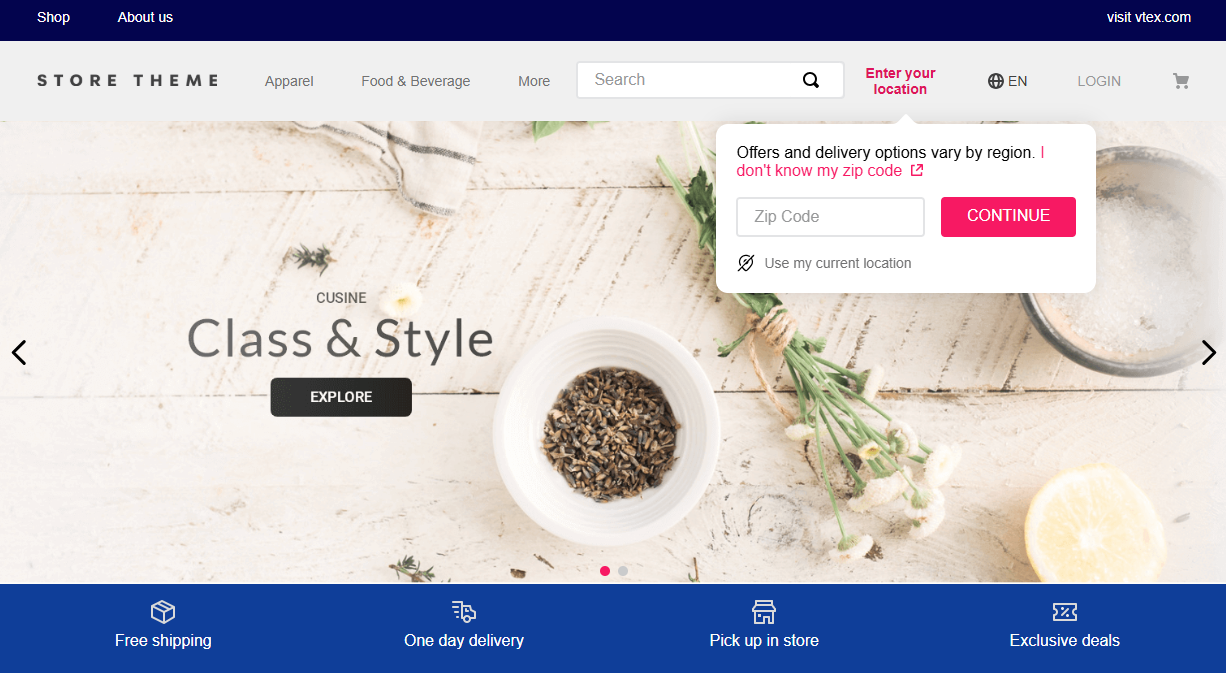Setting up Delivery Promise components (Beta)
This feature is in closed beta, which means that only selected customers can access it. If you are interested in implementing it in the future, please contact our Support team.
The Delivery Promise (Beta) feature helps create a more accurate and reliable shopping experience by ensuring customers only see products that can be delivered to the provided address or picked up at available locations.
The availability is displayed following these rules:
- For pickup points selected in the header or a specific pickup point, the system displays all available pickup points within a 50 km pickup radius configured in Checkout. There is no limit to the number of pickup points displayed.
- For the nearby pickup filter, pickup points within a 10 km radius of the buyer's location are displayed, with a maximum of 40 pickup points.
Delivery Promise supports any seller architecture (franchise accounts, VTEX Sellers, Seller Portal, and external sellers).

If you're building your storefront with Store Framework, you can enable this experience using two key apps:
- Shipping Option Components: Used to display a location selector.
- Search Result: Used to implement sidebar filters.
This guide walks you through the basic setup needed to implement these components in your store.
Explore the Delivery Promise Figma library to learn more about component specs, usage guidelines, reference use cases, and behavioral patterns.
Before you begin
To enable Delivery Promise (Beta) in your store, the following conditions must be met:
- The store must use Intelligent Search.
- Check if you have installed the
0.5.0or a later version of thesearch-sessionapp. To do this, run thevtex listcommand in your terminal and search for the app in the results. If you don’t have this app installed, run the commandvtex install vtex.search-session. - Your storefront must be built with Store Framework to enable the components in this guide. If you use FastStore, check the FastStore Delivery Promise implementation guide. If your store is headless, check Delivery Promise for headless stores.
Instructions
Step 1 - Requesting Delivery Promise activation
Contact our Support team to request the activation of Delivery Promise.
Step 2 - Displaying a location selector
To use Delivery Promise, customers must define a delivery address early in their shopping journey. The Shipping Option Components app provides blocks that allow users to select a location and display delivery options accordingly.
-
Add the
shipping-option-componentsapp to your theme dependencies in themanifest.jsonas shown below:_10"dependencies": {_10"vtex.shipping-option-components": "1.x"_10} -
Declare the
shipping-option-location-selectorblock as a child block of your header block, exported by thestore-headerapp. Example:_19"header.full": {_19"blocks": ["header-layout.desktop", "header-layout.mobile"]_19},_19_19"header-layout.desktop": {_19"children": [_19"header-row#1-desktop",_19]_19},_19_19"header-row#1-desktop": {_19"children": ["shipping-option-location-selector"],_19},_19_19"shipping-option-location-selector": {_19"props": {_19"compactMode": true,_19}_19}, -
Configure the behavior with props to customize how location selection is presented. Below, we highlight key uses of the available props.
Learn more about all the available props in Shipping Option Components.
When the customer provides their address, an initial selection of products is made to display only products that can be delivered to that location or picked up at pickup points within a radius of up to 50 km from the provided address — a limit determined by the Checkout. This selection impacts all subsequent product listings and filters.
Setting up a blocking modal
To ensure location input is provided before browsing, you can configure a blocking modal that displays when the page loads and can't be dismissed until a postal code is entered.
To do this, you must use both the callToAction and dismissible props:
-
callToAction: Defines which UI is displayed on load:modal: Displays a modal requiring postal code entry.popover-input(default): Opens a popover with a postal code input field.popover-button: Displays a button that opens the popover when clicked.
-
dismissible: When set tofalse, the modal can't be closed until a valid postal code is entered.
Configure the props as shown in the example below:
_10"shipping-option-location-selector": {_10 "props": {_10 "dismissible": false,_10 "callToAction": "modal"_10 }_10}
This configuration ensures the page is filtered for delivery availability from the first interaction, improving performance and relevance.
Defining displayed delivery methods
The shippingSelection prop controls which delivery methods are displayed:
delivery-and-pickup: Enables both delivery and pickup location options.only-pickup: Displays only the pickup selector (for example, in stores focusing on in-store pickup).
Configure the prop as shown in the example below:
_10"shipping-option-location-selector": {_10 "props": {_10 "shippingSelection": "delivery-and-pickup"_10 }_10}
Step 3 - Implementing sidebar filters
To display available delivery filters in the search sidebar, follow the steps below using the Search Result component. It automatically renders facets, including those related to delivery and pickup availability.
-
In your theme's
manifest.json, add thesearch-resultapp as a dependency:_10"dependencies": {_10"vtex.search-result": "3.x"_10} -
Ensure your theme includes the
search-result-layout.desktoporsearch-result-layout.mobileblock, depending on the layout.
Within this layout, make sure the sidebar block includes filter-navigator.v3:
_10 // store/search.json_10 {_10 "store.search#default": {_10 "blocks": ["search-result-layout.desktop"]_10 },_10 "search-result-layout.desktop": {_10 "children": ["filter-navigator.v3", "search-content"]_10 }_10 }
These blocks will display all applicable filters automatically. If a customer has selected a location using the Shipping Option component, delivery filters will reflect real-time availability based on that address.
The delivery promise filters are a beta feature and may be subject to breaking changes. If you customize this functionality, ensure your implementation can adapt to updates.